Melissa McCarthy The Happytime Murders
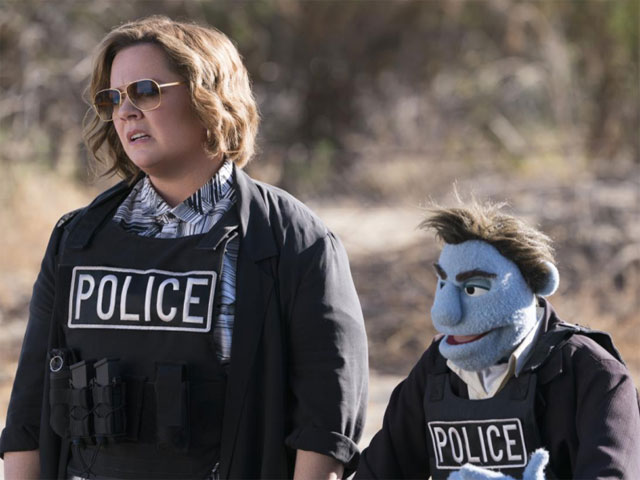
Melissa McCarthy The Happytime Murders
Cast: Elizabeth Banks, Melissa McCarthy, Maya Rudolph, Joel McHale
Director: Brian Henson
Genre: Comedy, Crime
Running Time: 91 minutes
Synopsis: The Happytime Murders is many things: a murder mystery, a crime drama, a buddy cop story, a tale of diversity and inclusion, and a fallen hero's redemption. What it isn't is safe for children in any sense. This is the most outrageously NSFK (Not Safe For Kids), R-rated comedy of the summer, showing how puppets behave behind closed doors without kids around. Featuring the comedic geniuses of Melissa Mccarthy, Maya Rudolph, Joel Mchale, and Elizabeth Banks, along with the Miskreant puppets from Henson Alternative, it's a hilarious whodunit that is decidedly No Sesame, All Street.
Set in Los Angeles, The Happytime Murders explores a world where humans and puppets coexist. Like most humans, puppets run the gamut of personalities, occupations, interests, and vices. Although puppets are living among humans, they are still viewed as second-class citizens during discrimination, bigotry, and violence as they attempt to find their place in the world, living with as much dignity as possible even though they're stuffed with fluff.
The film focuses on the fractured relationship between Melissa McCarthy as LAPD Detective Connie Edwards, a volatile veteran of the force with issues and a wicked sugar addiction, and Bill Barretta as Phil Phillips, her disgraced former puppet partner. They were once a star team and the pride of the department until an incident led to Phillips' dismissal. Having left the LAPD, Phillips is now a private investigator, "fighting for the felt" in the City of Angels. When several cast members of The Happytime Gang " a beloved children's program from the 90's " are murdered, Edwards and Phillips must begrudgingly reunite to track down the serial killer. Hilarity ensues as they fall into their old routine of constant bickering and trading insults while they infiltrate the fuzzy underbelly of Los Angeles.
Having delighted generations with their puppet creations in both television and films, The Jim Henson Company extends its legacy with adult-focused comedy with The Happytime Murders, the first feature film from Henson Alternative, the company's banner for exclusively adult content,, and the first R-rated movie with the full support, blessing, and authenticity of the Henson brand. Audiences will experience a world where humans and puppets coexist and they'll see just how similar the two worlds are, including the good, the bad…and the dirty.
The Happytime Murders
Release Date: August 23rd, 2018
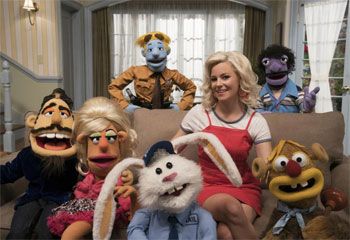 About The Production
About The Production
Introduction To The Story
An innovative film that incorporates influences from multiple genres to create a hilarious hybrid of film noir, crime drama, and cop buddy picture " with a healthy dose of RRated profanity and humor " The Happytime Murders focuses on a pair of estranged police detectives who must set aside their mutual animosity toward each other and work together again to solve a series of puppet murders in Los Angeles.
Phil Phillips (Bill Barretta) is Detective Edwards' disgraced former partner. After a scandal involving an accidental puppet civilian shooting in the line of duty, he left the LAPD in disgrace and is now a private investigator. He spends his time working cases on the seedy side of town " most of which involve some sort of puppet-related justice, served up toughguy vigilante style, which raises the ire of his former partner, who accuses him of acting as though the laws don't apply to him.
A new puppet client, Sandra White (Dorien Davies) " a sexy, chic redhead with an insatiable sexual appetite, who has been receiving extortion letters " hires Phillips to track down the mysterious person who has been sending the letters. While researching the new case in the back office at Vinny's Puppet Pleasureland adult bookstore and theatre, someone enters the shop and murders four puppets in cold felt. Phillips emerges from the office to find himself at the scene of a grizzly multiple puppet massacre, with one of the victims being a former cast member of The Happytime Gang " a beloved hit show from the 90's.
Edwards arrives to find Phillips and immediately labels him a suspect in the apparent robbery gone wrong, until Phillips points out that none of the money was taken. The two trade insults and assign blame until their heated exchange is broken up by Lieutenant Manning (Leslie David Baker), who tells Phil he's free to go, instructing him to leave via the back door to avoid stirring up any controversy, given his scandalous past and the arrival of the press at the crime scene.
Phil meets up with his brother, Larry (Victor Yerrid), another former Happytime Gang cast member who is eagerly awaiting the syndication deal for the show and its contractual windfall of cash. Larry and Phil are polar opposites with a strained relationship, but when Larry is gruesomely murdered, Phil arrives at the crime scene to find Edwards making crude and disrespectful remarks, unaware of the victim's identity, which prompts an attack by Phil. Lieutenant Manning admonishes them for their behavior, reminding them of their past career triumphs as a duo. Seeing the Happytime connection, Phillips is certain the killings are related and convinces Edwards and Manning of this.
Eager to resolve the case, Manning brings Phillips on as a consultant and forces him to team up with Edwards. When they protest, he threatens them both to ensure their cooperation; if they don't partner up again, he'll demote Edwards to a desk job, and turn Phil into a decorative throw pillow. Begrudgingly reunited, Phillips and Edwards find themselves forced to work through their issues and the case before the rest of The Happytime Gang are dead felt.
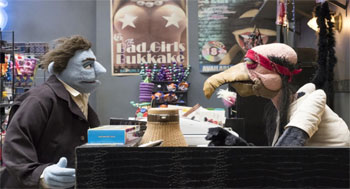 As they attempt to piece together the puzzle, they meet with Ronovan Scargle (Michael McDonald), the sleazy producer of The Happytime Gang, and they learn the details of the syndication deal, which gives 10 million dollars to the cast to share. The deal specifies that if a cast member dies, their spouse receives their share " if there is no spouse, that money will be shared among the remaining cast members.
As they attempt to piece together the puzzle, they meet with Ronovan Scargle (Michael McDonald), the sleazy producer of The Happytime Gang, and they learn the details of the syndication deal, which gives 10 million dollars to the cast to share. The deal specifies that if a cast member dies, their spouse receives their share " if there is no spouse, that money will be shared among the remaining cast members. Compelled to track down the remaining cast members, Phillips takes Edwards into the seedy puppet underbelly of Los Angeles, complete with sugar dealers, illegal card games, and puppet prostitutes offering potential clients "some rotten cotton." Edwards must deal with the exasperation of working with her former partner, and we see the extent of her addiction when some gangster puppets force her to take a big hit of their "grade A sucrose" " which would kill most humans. But for a "sugar smack" like her, it only provides the ultimate sugar rush.
As the plot thickens, more Happytime cast members are methodically eliminated and we discover that Phillips' new client has a shocking connection to the only human Happytime cast member, Jenny (Elizabeth Banks) " who also happens to be Phillips' former flame. When Ms. White propositions Phil, the obvious chemistry between them builds to an explosive level; what ensues will surely go down as one of the most graphic " and hilarious " sex scenes in film history. Phillips' loyal secretary, Bubbles, (played by Maya Rudolph) should earn a paid luxury vacation for going well above and beyond the call of duty to clean up that office.
The fabric of the film has many twists and turns, as we meet the rest of the Happytime gang, and they meet their respective ends at the hands of the killer. As the list of suspects narrows, Phillips finds himself double-crossed and in police custody as the prime suspect. Edwards, convinced of his innocence, has a physical altercation with FBI Special Agent Campbell (Joel McHale), which earns her a suspension from active duty. She teams up with Bubbles to track down the real killer and clear Phillips of any wrongdoing.
The unlikely sleuthing duo discover the identity of the killer, who is a step ahead of them, setting a fiery trap, which destroys the evidence and nearly costs Edwards and Bubbles their lives. In the grand tradition of gritty crime dramas, rules are broken, rifts repaired, alliances shift, and desperate measures are taken as both puppet and human fight to free Phillips in the tense climactic showdown.
A Puppet's Journey From Page To Screen:
It's hard to imagine that a visceral thriller like David Fincher's Seven would be one of the influences for a puppet murder mystery movie, but watching The Happytime Murders, that comparison doesn't seem that far-fetched. Screenwriter Todd Berger (Cover Versions) conceived the story with Dee Austin Robertson in 2001, taking cues from L.A. Confidential and Training Day, as well. "We were big fans of Seven, and I was huge Fincher head. So, we came up with this plot idea of this serial killer picking off puppets. Then taking it further, the puppets were specifically the cast of a children's television show," explains Berger. "It's set in a world where puppets actually exist; they are a species and they coexist with humans. Puppets have always been an underclass; they have their own economy, their own restaurants, they even have their own strip clubs. It's 'what would society look like if puppets were real?'"
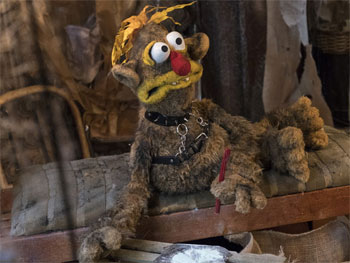 Berger began writing the script, exploring what happens when child performers grow up and the cameras aren't rolling anymore. "What if you were a puppet children's performer and now it's years later and you've gone and done different things with your life? Maybe some have gone on to better things, greener pastures, and maybe some haven't; their lives have fallen apart," says Berger. "Our intention was 'we're going to go make this. We're going to raise a million dollars and we're going to go make this epic crime story in Los Angeles with puppets.' We very quickly realized that was insane, because people read the script and were like 'what is this? It's a puppet murder movie with sex and violence and cursing, that's insane!' And 'you two realize this will cost way more than a million dollars, right? Have you guys ever made a puppet movie before?"
Berger began writing the script, exploring what happens when child performers grow up and the cameras aren't rolling anymore. "What if you were a puppet children's performer and now it's years later and you've gone and done different things with your life? Maybe some have gone on to better things, greener pastures, and maybe some haven't; their lives have fallen apart," says Berger. "Our intention was 'we're going to go make this. We're going to raise a million dollars and we're going to go make this epic crime story in Los Angeles with puppets.' We very quickly realized that was insane, because people read the script and were like 'what is this? It's a puppet murder movie with sex and violence and cursing, that's insane!' And 'you two realize this will cost way more than a million dollars, right? Have you guys ever made a puppet movie before?" Defeated, they put the script on the shelf, occasionally showing it to people for fun. A few years later, Berger had moved to L.A. and was a working writer when he received a phone call that would change everything. "My agent calls me and says, 'hey what's up with Happytime Murders?' I said, 'nothing "it's literally sitting on a shelf in my office gathering dust.'" His agent had received a call from The Jim Henson Company, which was growing its new division, Henson Alternative, and they were eager to create more R-rated content with a darker, more adult theme; specifically, they were looking to develop an R-rated puppet movie, so they were thrilled to learn that Berger had already written one " and they decided to option The Happytime Murders. That was 2007.
Over the course of the next decade, Berger and director Brian Henson continued shaping the script, all the while looking to secure financing and the perfect cast to bring this unique project to life, enduring disappointments along the way. "Every time we would think it might happen, it wouldn't, and I would always tell everyone, 'you know, when I'm sitting on set, I'll know it's real,'" recalls Berger. "And guess what guys? I'm here. I'm in one of those chairs and it says The Happytime Murders on the back."
Director Brian Henson has spent a lifetime and career around puppets. Son of the legendary Jim Henson, he grew up visiting the set of "Sesame Street" as a child and thinking, "Even with the Muppets, you know once they yell cut, and before the camera starts rolling again, there is some very adult humor spoken. I saw this as a kid when I used to watch my dad work. I loved this delicious naughtiness between takes," recalls Henson.
Most people know The Jim Henson Company's legacy of puppets, thanks to "Sesame Street" and "The Muppet Show," but its television lineage has long explored the comedy of puppets for adults dating as far back as the 1950's. The late Jim Henson actually started in late night television; his first show was on after the "The Tonight Show" and it was made for adults. As he evolved as an artist, Jim Henson also had puppets that were featured in the first season of "Saturday Night Live." Says Brian, "This film is not far from our roots, and we are actually going back to the foundation of the company, a very irreverent, adult side of humor. The Jim Henson Company is considered a very family friendly brand, but at the same time, can be a little bit naughty. "
Henson acknowledges the impact of such films as Team America and Meet the Feebles but is quick to differentiate The Happytime Murders: "We are not first. This film is more in the vein of Who Framed Roger Rabbit? " but with more bad language and suggestive situations. I want to make it clear " this is for adults. If we did it PG-13 and just skated the edge, I would still have an audience filled with five-year olds."
Henson first saw the Happytime script fourteen years ago, when he received a copy of it from screenwriter Todd Berger. Henson had always dreamed of making a film set in a world of humans with a minority puppet population and, although he loved the idea, he felt the script was a little too R-rated and ultimately passed on the project, wishing Berger luck. Eventually, Henson created Puppet Up! - Uncensored" a live, irreverant show combining puppetry with improvisational comedy, which he developed and toured. "Puppet Up! is very R-Rated. I finally felt like we found a contemporary voice for puppets, and this was the next step for the company and hand puppetry," explains Henson. The show's success prompted him to reconsider The Happytime Murders. "I felt like it was good timing to revisit Todd's script," says Henson. "This is the funniest film I have ever developed. It's basically a spin-off of our work with Puppet Up!. I finally found in Todd's script a story that would allow the puppeteers to let it rip!"
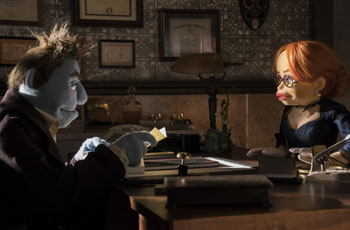 Although it delivers huge laughs, the film also explores some very current themes, including prejudice and acceptance. "In The Happytime Murders, the puppets are such havenots in this world, the best they can do is exist in a world that has been made for human beings " and complain about it all the time. That makes me laugh just thinking about that premise," muses Henson. "There is a lot of prejudice in this world in the film. Don't ever call a puppet a sock " that's a real nasty thing to say. And conversely, when puppets are mad at humans, they call them meat sacks."
Although it delivers huge laughs, the film also explores some very current themes, including prejudice and acceptance. "In The Happytime Murders, the puppets are such havenots in this world, the best they can do is exist in a world that has been made for human beings " and complain about it all the time. That makes me laugh just thinking about that premise," muses Henson. "There is a lot of prejudice in this world in the film. Don't ever call a puppet a sock " that's a real nasty thing to say. And conversely, when puppets are mad at humans, they call them meat sacks." As Henson and Berger developed the script, they discovered more than just the NSFW adult comedy. "What you think you have is a shock comedy where puppets are doing what you never thought you would see, when actually it is a really compelling story with deeply developed characters. It's a one-two punch."
That McCarthy Magic
As Brian Henson spent the past five years trying to find the right cast for his film, the puppet part proved to be a breeze; he already had immediate access to the best puppeteers on Earth, and he was confident that Jim Henson's Creature Shop would be perfect to create the puppet population in the film's world. However, finding the right human actors to convincingly marry the two worlds of humans and puppets through their performances proved to be a challenge " especially when casting the lead role of Detective Connie Edwards.
As fate would have it, the Happytime script had been sent to Melissa McCarthy and her husband and producing partner, Ben Falcone, by Adam Fogelson at STXfilms, who loved the script and thought Melissa might be the right fit. Falcone read the script first and felt it had some important points to make. "This was a world where puppets and humans live together and puppets are the outcasts of society. It's a cop movie, a solid buddy movie about their friendship reconnecting thru hard times, but at the core there is a message in there to treat people with equality," says Falcone. Once he finished the script, he passed it on to Melissa.
"On page two of reading The Happytime Murders, I walked out and I said to Ben, 'I think I'm in', and Ben said 'go read it some more and then come back out and tell me what you think.' And on page four I went back outside and said to Ben, 'I'm just saying I think I'm really in,'" says McCarthy, who was drawn to the project for more than just the comedy. "The social undercurrent of the script was really smart and saying something without preaching about it. It is what I dreamed it would be. A good gritty crime movie that happens to be really funny " and there is a side note that puppets are in it."
Interestingly enough, the role of Edwards was originally written as a male. "Edwards and Phil were written quite similar, and Todd and I discussed that they would be in a testosterone pissing match. One was still on the force, and the other had been kicked off the force," says Henson. "Then Melissa came aboard and her approach to playing Edwards was also as a tough cop who broke the rules and was in a testosterone pissing match with Philr, which was really wonderful."
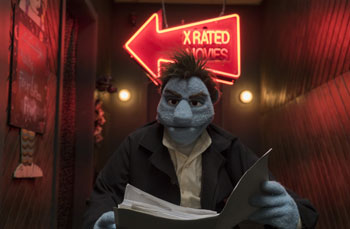 With McCarthy and Falcone onboard, The Happytime Murders was moving forward, and Detective Edwards' character evolved as McCarthy embraced the role. "Edwards has cranky moments. She's hard on rookies. She's hardboiled. She's been on the job long enough and that, combined with her over the top issues " one of them being her sugar problem " is a constant barrage of humor," says McCarthy of her character. She was interested in what made Edwards tick. "How is Edwards broken and how is she different? Those are two things I was wrestling with as I delved deep into writing the script, which was so good to begin with. My pass was just 'how would I identify with Edwards?'"
With McCarthy and Falcone onboard, The Happytime Murders was moving forward, and Detective Edwards' character evolved as McCarthy embraced the role. "Edwards has cranky moments. She's hard on rookies. She's hardboiled. She's been on the job long enough and that, combined with her over the top issues " one of them being her sugar problem " is a constant barrage of humor," says McCarthy of her character. She was interested in what made Edwards tick. "How is Edwards broken and how is she different? Those are two things I was wrestling with as I delved deep into writing the script, which was so good to begin with. My pass was just 'how would I identify with Edwards?'" The film explores some pretty dark issues such as bigotry and addiction. "There are dark areas in the story, there are goofy areas. The puppets are second-class citizens. Sugar is heroin for puppets. If you can make your point and make them laugh, people take it a little better," she explains.
Such character development pays off. For example, Edwards struggles with a sugar addiction so severe that she's graduated from candy bars and sweets to having a fridge stocked with maple syrup and Red Bull. The puppets take it even further, snorting what they refer to as "Grade A sucrose" through red licorice straws. Explains Henson, "In the film we imply there is a type of sugar so strong that only puppets can take it - and if a human ingested it they would go into sugar shock." Throughout the film, Edwards proves she's able to handle the hard stuff " and then some.
McCarthy has a simple explanation for the uncomfortable dynamic between Phillips and Edwards. "Both Edwards and her ex-cop partner, Phil, are damaged goods. The story can be very dark and complicated, but at the same time you still see brother/sister love between Edwards and Phil. They are best friends, and you can only fight like that with someone you love."
Regarding the film's realistic interaction between puppets and humans, McCarthy is matter-of-fact. "We all grew up with puppets, and then when they are inhabited in such a realistic way, it is that little voice in the back of your head that says, 'I knew they were real!'" She is quick to reinforce that it's decidedly NSFK (Not Safe For Kids). "There is nothing childlike about this film. It's a straight-up gritty comedy that happens to have puppets. It's a grown-up movie 100% " and I buy it 100%."
As for the film's leading lady, director Brian Henson has this to say: "What Melissa brings is a loose, spontaneous style that grows out of a lot of improvising on set. When it comes to comedy, she can do no wrong. She's the best there is."
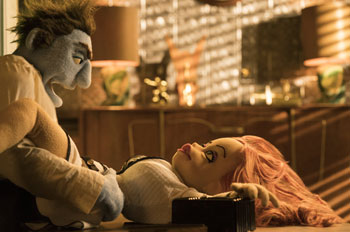 Bill As Phil
Bill As Phil "There is something about a puppet that takes you out of your subjective self and puts you in a more objective place. When a puppet appears on screen, you don't assume anything about them or their sexuality, you wait and you learn like a child does," explains director Brian Henson.
Few men can hold their own next to a comedy heavy-hitter like Melissa McCarthy, so it's a good thing that the male lead of The Happytime Murders is a puppet. Still, finding a costar capable of comedic sparring with McCarthy was no small task, so Henson turned to veteran puppeteer, Bill Barretta to bring the character of Phil Phillips to life.
Henson and Barretta met in 1982, when they were both eighteen, and Barretta began as a puppeteer in 1990. It was an added bonus that his father was a cop from Philadelphia, and his grandfather was a junk metal trader, which gave him tremendous insight into his character. "When Bill accesses his roots for the performance of Phil, it's really authentic. Bill transforms Phil into a real salt of the earth character," says Henson.
Phil and Edwards are cops who came up through the force together. He was the first puppet police officer and, in addition to being the most decorated partners in the department, they were also best friends who were inseparable " until an incident in the line of duty led to Edwards almost dying and created a rift between them. Phil was discharged from the LAPD, leaving the force in shame and scandal, and he re-invented himself as a private investigator, fighting bigotry and crimes against puppets. Phil is also something of an equal opportunity ladies' man, romancing both flesh and felt in the film.
McCarthy and her husband and producing partner, Ben Falcone, were surprised at how quickly she and the other human actors became accustomed to Barretta and the other puppeteers on the set. "I thought it was going to be weird, like looking at a tennis ball because there is not actual eye contact with the puppets, but fifteen minutes in, I bumped into Phil and apologized," recalls McCarthy. When she met Bill, he was only talking to her while performing Phil and any weirdness went away, and suddenly she was having a full-on conversation with the puppet, even when the cameras weren't rolling.
It was a true partnership, on screen and off. "Bill and I really see things similarly, and his performance is no different than a human actor. You forget Phil is a puppet. How he walks is unique, his gestures are so real, and when Phil is upset, everybody feels it. You get all this emotion and humor. It's a great magic trick. Bill has such a good feel for it and if something is not right, Bill and I can sit with it for a few moments and work it out. We were really in sync, which was a delight," says McCarthy of their collaboration. "Bill Barretta is a dream boat. He's such an incredibly grounded actor giving a really good, solid character performance as Phil in this film. I can't imagine anyone else in this role. He is a real wizard at what he does," says Melissa McCarthy of the actor behind her blue felt co-star.
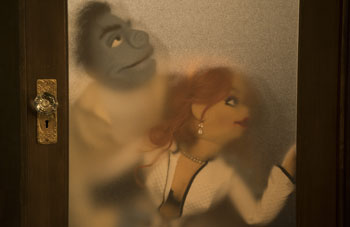 However, McCarthy wasn't the only human co-star to sing Barretta's praises " two other lovely ladies with whom Phil shares chemistry gave him high marks, as well. Maya Rudolph plays Bubbles, Phil's loyal and devoted secretary. "I didn't work for two weeks on set and I missed Phil and working with him. It was the strangest thing. I kept thinking about him. His big eyes and blue felt skin. I completely forgot he was a puppet," says Rudolph. In the film, Phil carries a torch for his ex-sweetheart, Jenny, played by Elizabeth Banks. "Jenny and Phil had a romance. Soft, sensual, felt, velvety love. His low-key charisma was something she couldn't get enough of and could depend on," declares Banks.
However, McCarthy wasn't the only human co-star to sing Barretta's praises " two other lovely ladies with whom Phil shares chemistry gave him high marks, as well. Maya Rudolph plays Bubbles, Phil's loyal and devoted secretary. "I didn't work for two weeks on set and I missed Phil and working with him. It was the strangest thing. I kept thinking about him. His big eyes and blue felt skin. I completely forgot he was a puppet," says Rudolph. In the film, Phil carries a torch for his ex-sweetheart, Jenny, played by Elizabeth Banks. "Jenny and Phil had a romance. Soft, sensual, felt, velvety love. His low-key charisma was something she couldn't get enough of and could depend on," declares Banks. Producer Ben Falcone agrees that Barretta's embodiment of Phil is key to the film: "This movie has great heart reflected thru the script and Melissa's and Bill's performances. Hopefully, when people are watching the film and are shocked by this or that, our good heart is going to come thru."
Puppets Made To Order
The puppet population of The Happytime Murders is comprised of more than one hundred and twenty-five unique puppets, custom designed and painstakingly handmade by a team of talented puppet designers, many of whom have award-winning backgrounds in puppet building, costume design and sculpture. The newly designed puppets were crafted by Jim Henson's Creature Shop, with most characters built in the shop's New York location and Phil created in the Los Angeles location so that director Brian Henson could guide the process, lending creative input throughout the build to ensure his leading man would be ready for action.
As a puppeteer himself, Henson is always curious about how puppets function and feel, as well as what makes them likable, lovable, and relatable. He is also passionate about the design process and strives to ensure these factors are considered when creating new characters. During pre-production for the film, each puppet began with a simple line drawing that would then be submitted for Henson's approval. Once approved, the drawing is blown up to the actual size of the puppet; then, a 3D foam mock-up is made with attention to such details as color, skin texture, and hair to help shape the look of the puppet. The builders then match these details with swatch pages for each character to determine which material will be used in the design process.
Of course, each puppet is unique, but all must accommodate the human that will be manipulating them from the inside. The puppets use athletic mesh at foam-to-foam transition points to help prevent the characters' clothing from getting stuck in the joints. Larger puppets require casing and boning to help hold the body shape in place so they look right on camera. Usually, you see hand and rod puppets cut off at the waist and rarely see their legs, but the unique and groundbreaking world of The Happytime Murders has a huge puppet population and it was Henson's goal to see them walking around and interacting with humans. This required creating lower bodies for the puppets so they can actually be seen walking, which meant that each walking puppet would have full-bodied pelvises, legs, and feet. Each full-size walking puppet required three puppeteers " one each for the body, the arms, and the feet ", which required extensive rehearsals to create specific walks for each character.
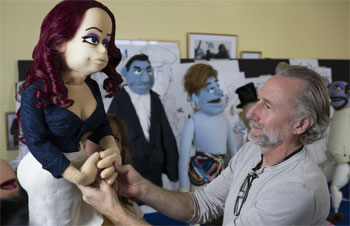 The Creature Shop team also made seven "clodhoppers" " 3 ½ to 4 feet tall full-body puppets " that attached to the feet of a puppeteer, so as they move and walk around, so does the puppet. To create this realistic mobile puppet performance, the puppeteer had to wear a full green screen suit, which would be digitally removed in post-production. The making of the Phil puppet was a true labor of love. Bringing the film's main character to life required construction of six separate Phil bodies, each measuring close to four feet in height when standing upright. Further, each body was specifically designed for different things, and six different styles of hands were made, some mechanically controlled, with the hands interchangeable to each different body type. In the end, eight pairs of hands were used with the six different bodies, allowing Phil to do a variety of things from smoking, to pouring a drink, to holding his gun. Phil's body was also specially modified to allow the puppeteer to operate it from different locations such as the back, head, or chest, to ensure that the character could be shot from different angles. There is even a stunt puppet that was made specifically for Phil's hilarious hot tub fight with Edwards.
The Creature Shop team also made seven "clodhoppers" " 3 ½ to 4 feet tall full-body puppets " that attached to the feet of a puppeteer, so as they move and walk around, so does the puppet. To create this realistic mobile puppet performance, the puppeteer had to wear a full green screen suit, which would be digitally removed in post-production. The making of the Phil puppet was a true labor of love. Bringing the film's main character to life required construction of six separate Phil bodies, each measuring close to four feet in height when standing upright. Further, each body was specifically designed for different things, and six different styles of hands were made, some mechanically controlled, with the hands interchangeable to each different body type. In the end, eight pairs of hands were used with the six different bodies, allowing Phil to do a variety of things from smoking, to pouring a drink, to holding his gun. Phil's body was also specially modified to allow the puppeteer to operate it from different locations such as the back, head, or chest, to ensure that the character could be shot from different angles. There is even a stunt puppet that was made specifically for Phil's hilarious hot tub fight with Edwards. Puppet coordinator Kevin Clash worked closely with a Creature Shop team of eight people, led by Lara Maclean and Scott Johnson. This team split themselves between the set and an onstage puppet workshop, always keeping one step ahead of the shooting crew, so the right puppet would be ready in the right wardrobe/ hair/ makeup when needed on set. Since as they were among the film's leading cast, the puppets on set received just as much attention and TLC as their human co-stars, albeit in a slightly different way " they needed constant rigging, repairs, and styling.
One scene that required such special attention and care is also arguably the film's most outrageous sequence: the sex scene between Phil and Sandra. To ensure audiences will be howling with laughter, Henson insisted on using practical SFX for the scene's sticky sight gag. "We have not been censoring ourselves. We have stepped over in a couple of places. The idea is that it really is uncensored. It's implied sexuality. For example, the puppets ejaculate Silly String, but you don't see their penises. That was some brilliant live SFX in action! And for the record, we used two cans of Silly String per take " and it wasn't enough!"
It's Hard Out Here For A Puppeteer
"If you are comfortable when you are puppeteering, then you're doing something wrong." This statement " from a puppeteer with their outstretched arm extended high above their head to reach through the floor of the set and into camera frame " is both an explanation and a mission statement for the talented performers who bring the puppet population of The Happytime Murders to life. They must contort, stretch, and manipulate their bodies into multiple positions to get the right angle, allowing the camera to get the shot " and they must do it without forgetting a line of dialogue or missing a beat of their performance.
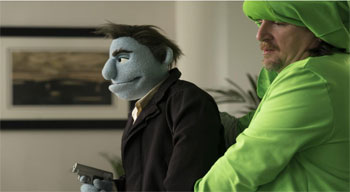 In order to make it easier for the puppeteers to act alongside their human counterparts, nearly every set was built on a raised 42" platform, which featured large cut out sections that could be pulled out to accommodate the movements of both the puppeteers and puppets. This allowed them to more easily work with the human actors, resulting in more realistic interactions. "Sometimes we cut holes in the floor, sometimes holes were cut in the walls, and sometimes large sections of the floors were taken out in order to accommodate the puppeteers and the puppets. Once we would rehearse and block the scene, we would do whatever was needed to make it work for the scene," says production designer Chris Spellman.
In order to make it easier for the puppeteers to act alongside their human counterparts, nearly every set was built on a raised 42" platform, which featured large cut out sections that could be pulled out to accommodate the movements of both the puppeteers and puppets. This allowed them to more easily work with the human actors, resulting in more realistic interactions. "Sometimes we cut holes in the floor, sometimes holes were cut in the walls, and sometimes large sections of the floors were taken out in order to accommodate the puppeteers and the puppets. Once we would rehearse and block the scene, we would do whatever was needed to make it work for the scene," says production designer Chris Spellman. For the scenes between humans and puppets, there is much more going on than what appears onscreen in the finished shot; it's not always comfortable for the puppeteers. For example, take the hot tub scene involving puppet Larry and his human girlfriend, Brittenie. "Through the rubber glove I am puppeteering with, I can feel the hot water that is in the hot tub. I'm way underneath the set under the hot tub with my arm outstretched in the rubber glove, and I'm talking to actress Cynthy Wu in the scenes like nothing unusual is happening. It's just one of those bizarre puppeteer moments where it's 2 in the morning and water's leaking out of this giant hot tub and I'm freezing cold. But on the monitor, I'm seeing this pristine puppet and this beautiful girl in a bikini and I'm like 'what life am I living right now'?" says puppeteer Victor Yerrid, who plays Larry.
Director Brian Henson admits that this was no easy shoot. "Every scene is tough. This is a tough show for the puppeteers. As the director, I have a vision and a plan, but fully respect the artists and let them present what they think and run with it. I let the puppeteers run with it. I let the actors run with it. My job is to flex with all involved."
"Brian directs humans and puppets the same. It's so incredibly technical. Once that's in place he focuses on the characters and what he does," says McCarthy. "Brian is so technically adept to this process and how to make the puppet come to life and push their physicality in every way. There is no way to do this movie without Brian Henson. He has grown up with it. It's in his DNA."
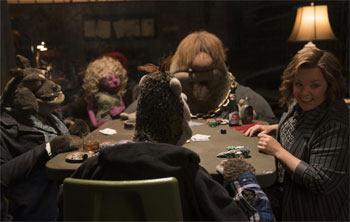 Parting Thoughts From The Meat Sacks
Parting Thoughts From The Meat Sacks The human cast of The Happytime Murders features a serious comedy pedigree, with Maya Rudolph (Bridesmaids, "Saturday Night Live"), Joel McHale ("Community," Netflix's "The Joel McHale Show with Joel McHale"), and Elizabeth Banks (the Pitch Perfect and The Hunger Games film franchises) each lending their comedic talents to the film.
Maya Rudolph was thrilled to reunite onscreen with her friend and Bridesmaids costar, Melissa McCarthy, and Melissa's husband, producer Ben Falcone. "Ben and Melissa are old friends of mine since we were, like, 24. We were in the Groundlings together and they've seen all the embarrassing things that I've done in my life " and still ask me to come, which is super nice," she enthuses.
The film's R-rated humor might be shocking to some, but to Rudolph, it's a logical progression. "It makes a lot of sense in a comedy mind, because the thing that comedians like to do more than anything is get as dirty as possible to make other comedians laugh " and I feel that's what I'm seeing take place in a puppetry world here. It's like the next step, watching puppets do the vilest things possible. It's just really funny."
Rudolph feels people will embrace the film. "I think audiences are going to see a side of puppets they've never seen before in this weirdly satisfying way that's sort of full circle. They get to see the real life of puppets that they probably knew was there all along. And I think it is generationally a movie for people that grew up with these puppets and are adult now and can be in on the joke on how they've never really spoken this way before and now it's a 'for us by us' movie."
Onscreen as FBI Special Agent Campbell, Joel McHale has a very adversarial relationship with puppet P.I., Phil Phillips, but off-screen, McHale has nothing but respect for both the puppet and Phil's puppeteer, Bill Barretta. "It's an amazing thing to watch because it's like they've learned a whole other language, a whole other way to perform. When you're shooting, you don't even see them " you just look at the puppet and the puppet's alive. And then as soon as they yell cut, the puppet dies. I can't imagine the level of training and the time, practice, and rehearsal. It really is an extraordinary thing to watch them work; they have a skill set that is very specific." As for the film itself, McHale is emphatic. "This movie really is unique. Nothing like this has been done. And usually when something has never been done before, 99% of the time it's a massive failure. But once in a while, that 1% " BOOM! " the world changes. And that's what The Happytime Murders will do for cinema."
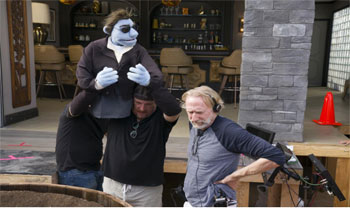 As Jenny, Phil's former flame and the only human Happytime Gang cast member, Elizabeth Banks feels that, despite the R-rated humor, the film has more to say. "That's the idea in this script to talk about marginalized communities, racism, misogyny. We don't just like to entertain. We like to have a message here. All of it, and how we approach things as a society. There is a lot at work here in this story besides comedy and puppets, and that makes it a really interesting project."
As Jenny, Phil's former flame and the only human Happytime Gang cast member, Elizabeth Banks feels that, despite the R-rated humor, the film has more to say. "That's the idea in this script to talk about marginalized communities, racism, misogyny. We don't just like to entertain. We like to have a message here. All of it, and how we approach things as a society. There is a lot at work here in this story besides comedy and puppets, and that makes it a really interesting project." Banks also found acting opposite these puppets a surprisingly profound experience. "The puppets just all feel like extensions of the actors portraying them, who are hilariously funny and have bits they have been perfecting over the many years they have been doing this art form. So, you know Bill is Phil. In the scenes, you can easily forget that it's a puppet; it really just feels like a scene partner. It's just another great character that's been created that sits across from you. Their eyes are so intense, and they are beautiful and soulful. To me it's almost an extension of very old art forms," observes Banks. "I think that's what's so cool about puppets "you really feel a sense of their inner lives. They get to be colorful and beautiful and be representative of the multi-cultural, multi-ethnic thing that we all are on " this little blue planet floating around in space. "
The Happytime Murders
Release Date: August 23rd, 2018
MORE



